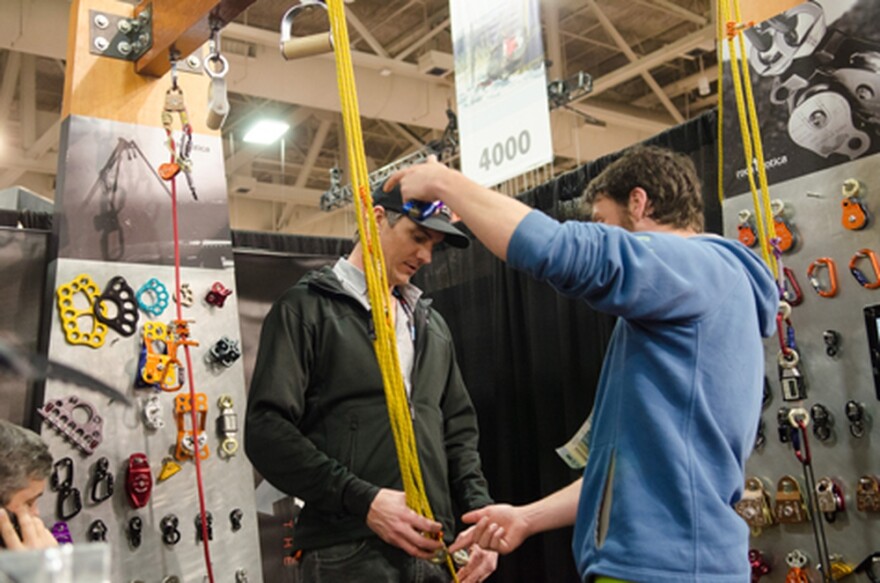Outdoor retailers are running a national campaign asking for Utah's Congressional delegation to protect public lands. They also say Congress should fund existing public facilities.
Those same industry leaders are working with Utah outdoor recreation planners to encourage Congress to consider all aspects of public land use including impacts to recreation retailers, the economy, and gateway communities.
Tom Adams spent twenty five years working as the North America Sales Director for Petzl America before becoming director of Utah's Office of Outdoor Recreation.
"If I didn't fully believe in Utah and our ability to become greater in this industry I wouldn't have left the private sector to run this office,” Adams says. “So, I'm pretty thrilled to be here."
In his position now, Adams works directly with outdoor retailers and organizers of two industry shows in Utah. Companies come to Salt Lake City from all over the country to promote and premier their products during the Outdoor Retailer Market.
"Everyone that has ever come to Utah for the trade show comes here because it is logistically superior but they can go do outdoor recreation activities within minutes,” Adams says. “They can be skiing within 30 minutes or they could go to Zion, Arches, Bryce, Capital Reef, Canyonlands."
Opposition by Utah's Congressional delegation to the Bears Ears National Monument has some outdoor retailers questioning Utah as the best place to hold the market. During their most recent show in January, industry leaders shared verbal and written concerns about Utah's governor and the majority of state lawmakers. They believe the political mood in Utah could have an impact on the health and happiness of Americans and threaten business.
"The initial conversation started around as, hey as an industry we should potentially look at moving the show and I think the conversation has changed a little bit to, we don't necessarily need to move the show as much,” Adam says. “That might not be the main focal point, but we do need to protect federal lands and make sure they are open to everybody."
67 percent of Utah land is public land. That land is key to tourism in the state. Adams says his office cannot deny the benefits of having a retailer show in Utah that brings in $40 million dollars twice a year.
"The trade show folks, they are running a business, and they want to have the best show possible and the people coming to the show also want to have a successful and productive show,” Adams says. “Federal lands is a place where people recreate and use their products.”
Moving the conversation, and not the show, led to an industry wide ad and letter writing campaign involving REI, North Face, Patagonia and the 1200 members of the Outdoor Industry Association. Letters have been sent to Congressional committees and ads ran in the Washington Post. Organizers say they want Congress to maintain the state’s national parks and monuments.
Adams says, right now there is a back log of $12.5 million in outstanding costs to cover the maintenance and needed upgrades to national park and monument facilities.
Members of the Utah Congressional delegation serve on committees that help fund public land management. Amy Roberts, director of the Outdoor Industry Association, says they are in a unique position to show leadership and fund public places.
"What we really want them to hear, is the economic value of our industry. But also to know that as different land management decisions are made, we are committed to working with the Utah delegation through the legislative process when possible,” Roberts says. “But sometimes our opinion and the Utah delegation’s opinion may diverge.”
Adams likes the idea of industry leaders working together to educate policy makers about the role outdoor recreation plays in this country. He says the national ad campaign emphasizes the industry’s economic contributions. And it helps explain why outdoor recreation in the U.S. should be a priority. He also recognizes the need for input from residents and community members living near those public lands.
“It's sticky in the fact that, especially in our state, we have had two monuments declared,” Adams says. “The gateway communities and our local voice doesn't truly seem to be heard in these decisions. We are in a position where a lot of these communities completely have to change their way of living. Because how they might have been using the land or planned to use some of the land is now completely changed. It's a challenge."
With a new administration, both Adams and Roberts are watching Montana Congressman Ryan Zinke, Trumps Interior Secretary nominee, to gauge his position on public lands and public access.
"You know I think Secretary Jewell has done a great job in the past and even Ryan Zinke did a great job in his hearings letting people know that public lands are public and we need to protect them,” Adams says. “But we also need to hear from gateway communities on what is important to them and how they feel the land could be used.”
Robins watched Zine in 2016 as the Republican platform committee discussed selling off public lands.
"And he actually took the position of stepping off the platform committee and not wanting to participate in that and feeling strongly that public lands, at least in Montana at that time, should be kept public. I think that he will bring that view into his job assuming he is confirmed at the interior department. So we do feel really positive about that,” Robins says.
For now, Adams is preparing to meet with Utah lawmakers during the 2017 Utah Legislative Session to secure more than $1 million in Industrial Assistance Funds needed to pay for tents to be used during the 2017 outdoor retailer summer market.



